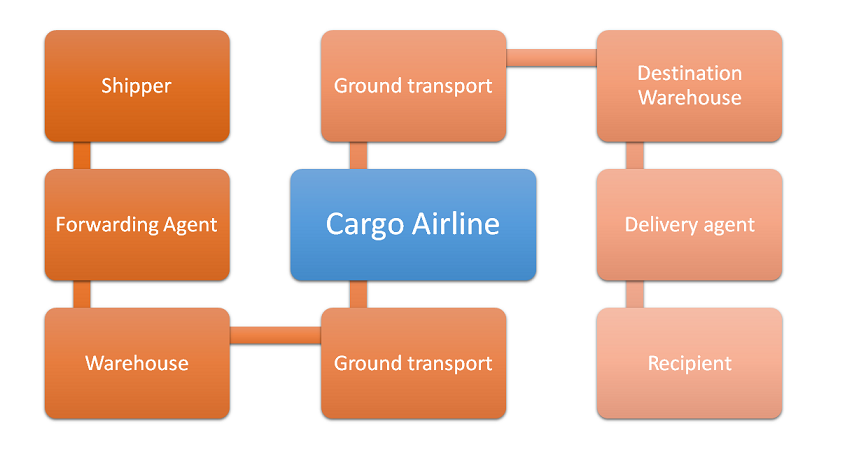Air cargo is a complex business involving a massive supply chain that stretches all across the globe. The ecosystem is divided in a very granular manner, with the airline itself handling a very small portion of the cargo movement and the rest being handled by partners which are far from seamless in their connection to the chain. Between the shipper and the receiver, every package passes through several hands with varying degrees of manual and automated operation.
In the absence of full digitization, the excessive number of non-standardized intermediaries in the network form weak links on the chain. The solution is undoubtedly a full digital recast of the business, but that too comes with its own set of challenges if there is a lack of clarity or disagreement in objectives: 
-
-
-
- Airlines don’t have complete control over the value chain. Partners entrusted with handling cargo in other phases of movement aren’t necessarily well connected with each other. This prevents full visibility and traceability of goods.
- Partners are in varying degrees of maturity in their business; hence there is likely to be resistance against measures to improve transparency and accountability across the value chain. Part of the problem is a lack of a clear leadership structure to enforce this.
- Information about the shipment is passed along the chain through an Air Way Bill (AWB) document and its related transactional information that is maintained separately by each party and hence extremely error-prone. There is a total lack of consistency and no means to ensure accuracy across the chain. Let alone a single version of truth even an electronic version of the basic AWB document is being heavily promoted by bodies like IATA, but adoption is still way behind schedule
- The anomalous capacity paradox leads to reduced yield from the cargo business. While airlines following the pure cargo model are in desperate of improving their platform, hybrid model (passenger plus cargo) airlines may seek clearer ROI propositions.
-
-
While there is widespread consensus on the need for digitization and effective data sharing mechanisms (a data backbone for the industry), there are multiple concerns around ownership of such platforms and the neutrality required in implementing the operation effectively. All the missing pieces point towards blockchain as a viable solution.
The case for blockchains
Blockchains, by their very nature, offer transparency, data security and decentralized operation – all of which put together will enable us to solve many of the problems that the cargo industry has been grappling with for a long time. There is a lot of skepticism around the concept, with some people even calling it a “solution looking for a problem” – one which airline cargo may provide! A recent Stanford University study estimates that a good 86% of R&D initiatives around blockchain are solving genuine problems, and 55% of these are expected to make an impact within a year. Around 14%, however, belonged in the “hype” category according to the study.
As part of our rigorous investment in R&D (into which we channel back a good percentage of our company revenue), we have experimented significantly with the operational aspects of air cargo on a blockchain platform and got some very useful insights. Fortunately, we are at a phase of technology evolution where cargo business leaders need not worry a lot about feasibility anymore – at least, boundaries are rather wide in that sense. They should instead focus on the specific results they seek from blockchain in their business.
Capabilities and applications
I don’t want to get into a full description of a blockchain or how it works – you can read it in this blog post How to explain blockchains to a 10 year old if you need an update. But the key feature we harness in airline cargo systems will be the immutability of a blockchain, as well as the decentralized ledger concept. This will help us build supply chains that are capable of handling shipments which are fully traceable from its origins at a component level, ensuring full integrity at all phases of movement. Some examples:
- Pharmaceuticals which need to be handled within specific temperature/humidity conditions at all phases of shipment and need to be individually certified for this by each handling partner. A shipment which encountered warm temperatures for even 1% of the entire chain will still be worthless. Blockchains can help implement constant monitoring and isolate the specific area in case of any failure in the chain
- Precision equipment is typically prone to forgery of components, whereby expensive genuine parts are illegally replaced with cheap duplicates, by middlemen who handle the shipment somewhere on the chain. Blockchains can be used to create a structure where shipments don’t proceed from one phase to another until signed off by all parties in the transaction
- Diamonds are considered illegal in the international community if sourced from conflict regions or extracted through slave labor. Every shipment can be tracked from its source until its final destination, to ensure there is no illicit additions or replacements made in the shipment.
To an astute airline company, this gives the opportunity for a distinct array of cargo products, in alignment with the high value-to-volume ratio which is characteristic of the industry. It is also possible to implement staggered payment models (payment for each component as it passes through the value chain), using smart contracts implemented through blockchains.
Conclusion
Entrepreneurs and technologists sometimes joke that the biggest problem solved by blockchain is “funding” – a reference to the legend that including the word “blockchain” in product descriptions makes it easier to secure VC investments. Whether that’s true or not, there is absolutely no doubt that the airline cargo industry has a lot to gain from deploying blockchain in the right places. Plugging revenue leakages and isolating supply chain failures stand out for the airline, but there is a bigger picture – of superior cargo products, facilitating not just unprecedented efficiency but also better compliance with the global rules of trade. Regulatory bodies will be able to implement policy changes, clearance information and tariff regulations in an instantaneous manner, tracking violations and leakages more effectively than ever before.
Source: https://blog.ibsplc.com/airline-cargo/why-air-cargo-needs-a-blockchain-boost



